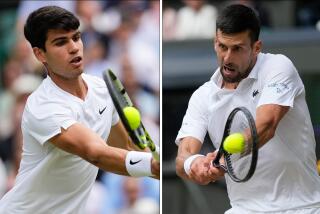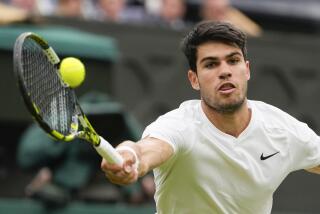Andre in Giant Company Now
- Share via
PARIS — The final step of Andre Agassi’s rush week--for admittance into the hallowed tennis fraternity of Laver, Emerson, Perry and Budge--was almost like a cruel hazing ritual.
Agassi, essentially, was forced to relive his recent career in the French Open final against Andrei Medvedev of Ukraine on Sunday. For two sets, he looked like the guy who had plummeted to 140th in the world two years ago.
Then, the skies cleared, the sun came out, and Agassi got to be himself, the one who has been something of a clay-court guru. The new Agassi subdued the old Agassi, and he beat Medvedev in an inspiring final, 1-6, 2-6, 6-4, 6-3, 6-4, in 2 hours 52 minutes.
Agassi’s first French Open title put him in the rarefied company of Rod Laver, Roy Emerson, Fred Perry and Don Budge as the only players to win a career Grand Slam. Agassi won Wimbledon in 1992, the U.S. Open in 1994 and the Australian Open in 1995. Laver was the last one to accomplish the feat 30 years ago, as he won all four in the same calendar year.
Fittingly, Laver was the one who presented Agassi with the winner’s trophy. An emotional Agassi paid homage to Laver, bowing to him. By then, Agassi had wiped away his tears of joy. After Medvedev’s final forehand went flying long, Agassi put his arms in the air, acknowledging his supporters in the friends’ box. Then he put his hands over his eyes and cried.
Medvedev, in a classy move, came over to Agassi’s side of the net and hugged him, reminiscent of runner-up Alex Corretja hugging Carlos Moya last year. Medvedev and Agassi shared a few words, and later hugged during the awards ceremony, a genuine feeling of esprit de corps.
“It’s been a lot of years since I had this opportunity,” Agassi said. “I never dreamed I would see this day.”
Said his coach, Brad Gilbert: “He put a lot of ghosts to rest. A lot of people say Andre can’t win a big match, can’t win from two sets to none down, can’t win a five-set match, can’t win on clay. There were a lot of demons put to rest.”
And all on the same day.
Agassi, the 13th-seeded player, won his first French title after losing twice in the final, in 1990 and 1991. He is 16-16 in five-set matches, having won two of them here. And this is the third time Agassi has rallied from a two-sets-to-none deficit, the other times being at the Australian Open in 1996 against Jim Courier and in a 1997 Davis Cup match against Jan Siemerink of the Netherlands.
“This is certainly the greatest feeling that I’ve ever had on the tennis court,” Agassi said. “I don’t even think it’s sunk in yet. That’s what makes it even more amazing.”
Said Medvedev: “He has a right to say now that he’s a greater player than say, Pete [Sampras], by winning all four Grand Slams. It’s an argument that he can [make]. He has a right to have it.”
Medvedev sat slumped in his courtside chair, trying to comprehend how it all slipped away. He played impeccable tennis the first two sets, winning the first one in 19 minutes and keeping it up after a brief 20-minute rain delay. He also won 100% of the points when he got his first serve in during the first two sets.
The turning point came in the third set in the ninth game. Medvedev had a break point to go ahead 5-4, which would have enabled him to serve for the title. Agassi staved it off with a volley, and he was able to start connecting with his backhand down the line and Medvedev hit a lull.
“From the depths of nowhere, he’s got nothing on Houdini sometimes,” Gilbert said. “Sometimes you expect the most from him and he gives you the least. Sometimes when you think there’s no way he could show you this again, he can reach back and grab some magic like nobody.”
Agassi admitted he was trying to prevent total humiliation.
“To be quite honest, I was in shock,” he said of winning only three games the first two sets.
“I was embarrassed actually. Real disappointed with the fact the finals was potentially a blowout. At that point, I was just trying to stay alive and hope something good could happen.”
He started having flashbacks of the losses to Andres Gomez and Courier in the other two finals here.
“I was nervous,” Agassi said. “I was trying to control the point, and I felt like I wasn’t hitting the ball. I was trying to move and my legs weren’t going. It was a very, very scary feeling out there, and I fought through it. . . . I’m a proven war dog. I’ve been through it out here a lot of times. I can eat when I’m not hungry and I can sleep when I’m not tired. But you can’t always control your nerves when you get out on the court.”
Medvedev’s serve kept him alive in the final two sets, especially the fourth, in which he had nine aces. He had 23 aces and eight double faults.
By the time Medvedev came into the interview room, he regained his equanimity. At No. 100, he was the lowest-ranked French finalist in the Open era.
“If you think that I am not smiling too much, that’s only because I lost the final,” Medvedev said. “I feel that I had a legitimate chance to win. But inside, I’m smiling. I’m happy.
“Regardless of what happens to me in the future, if I win three Grand Slams in a row, four in a row, these two weeks will be the best two weeks of my life.”
Medvedev had one solution to prevent himself from backsliding.
“Looks like I just have to stick to Anke [Huber] and make sure she doesn’t leave me and then I will be fine,” he said of his girlfriend, a player on the women’s tour.
Agassi can give him advice about handling the ups and downs of tennis and life. At 29, he feels positively fresh and ready for new challenges, pointing out it would be nice to win the French and Wimbledon in the same year.
To him, Steffi Graf’s victory on Saturday was almost a sign. Agassi nearly missed playing here because of a shoulder injury, and Graf was advised by some of her associates to skip Paris. But both moved forward.
“It was almost like it was destiny, this tournament for her, in some case for me too,” Agassi said. “When I won my first Grand Slam, she was the winner. When she won yesterday, I think it might have been a little inspiring to me.
“But she’s won 22 Slams, and she’s never lost intensity over the years. It’s easy to see why she might feel tired.
“Me, on the other hand, I’ve taken leaves of absence for years at a time. I feel like a spring chicken.”
(BEGIN TEXT OF INFOBOX / INFOGRAPHIC)
GREATEST OF THEM ALL
Men who have won each of the four major tournaments in their career:
ROY EMERSON (12)
Australian (6), French (2), Wimbledon (2), U.S. Open (2)
ROD LAVER (11)
Australian (3), French (2), Wimbledon (4), U.S. (2)
FRED PERRY (8)
Australian (1), French (1), Wimbledon (3), U.S. (3)
DON BUDGE (6)
Australian (1), French (1), Wimbledon (2), U.S. (2)
ANDRE AGASSI (4)
Australian (1), French (1), Wimbledon (1), U.S. (1)
Grand Masters
A look at the Grand Slam victories by the five men to win all four events in their career:
*
ANDRE AGASSI
AUSTRALIAN OPEN
1995: d. Pete Sampras
FRENCH OPEN
1999: d. Andrei Medvedev
WIMBLEDON
1992: d. Goran Ivanisevic
U.S. OPEN
1994: d. Michael Stich
*
DON BUDGE
AUSTRALIAN OPEN
1938: d. Jack Bromwich
FRENCH OPEN
1938: d. Roderick Menzel
WIMBLEDON
1937: d. Gottfried von Cramm
1938: d. Henry Austin
U.S. OPEN
1937: d. Von Cramm
1938: d. Gene Mako
*
FRED PERRY
AUSTRALIAN OPEN
1934: d. Jack Crawford
FRENCH OPEN
1935: d. Von Cramm
WIMBLEDON
1934: d. Crawford
1935: d. Von Cramm
1936: d. Von Cramm
U.S. OPEN
1933: d. Crawford
1934: d. Wilmer Allison
1936: d. Budge
*
ROY EMERESON
AUSTRALIAN OPEN
1961: d. Rod Laver
1963: d. Ken Fletcher
1964: d. Fred Stolle
1965: d. Stolle
1966: d. Arthur Ashe
1967: d. Ashe
FRENCH OPEN
1963: d. Pierre Darmon
1967: d. Tony Roche
WIMBLEDON
1964: d. Stolle
1965: d. Stolle
U.S. OPEN
1961: d. Laver
1964: d. Stolle
*
ROD LAVER
AUSTRALIAN OPEN
1960: d. Neale Fraser
1962: d. Emerson
1969: d. Andres Gimeno
FRENCH OPEN
1962: d. Emerson
1969: d. Ken Rosewall
WIMBLEDON
1961: d. Chuck McKinley
1962: d. Martin Mulligan
1968: d. Roche
1969: d. John Newcombe
U.S. OPEN
1962: d. Emerson
1969: d. Roche
MOST MAJORS
1. Emerson: 12
2. Sampras: 11
2. Bjorn Borg: 11
2. Laver: 11
5. Bill Tilden: 10
6. Perry: 8
6. Jimmy Connors: 8
6. Rosewall: 8
6. Ivan Lendl: 8
10. Eight tied with 7
More to Read
Go beyond the scoreboard
Get the latest on L.A.'s teams in the daily Sports Report newsletter.
You may occasionally receive promotional content from the Los Angeles Times.











